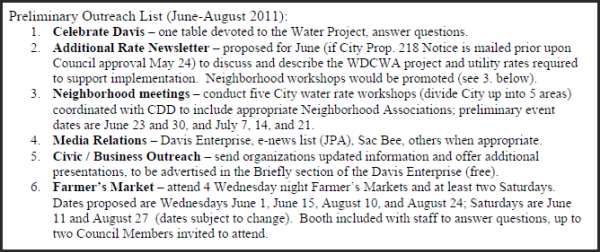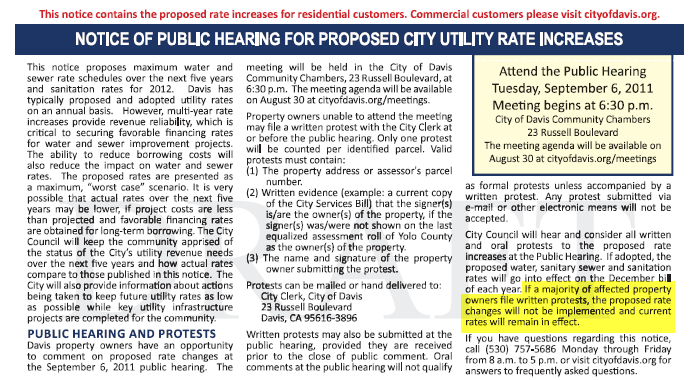Originally, the city had scheduled the new rates to occur in the summer during peak use and originally the city was going to notice just one meeting.
The council did insist on a multiyear rate increase for five reasons.
First, city staff argues, “Adopting a multi-year rate plan would position the City to secure the best available financing and grant funding opportunities to fund its large capital improvement projects.”
Second they claim, “Potential project bidders would likely be more willing to submit their most competitive bidding packages to the City if utility rates and financing are in place to move the capital projects forward under current schedules (2016 for water and 2017 for WWTP).”
Third, “Both the current market financing conditions and construction bidding environment are still in favorable cycles for the City to be securing project financing and project bids that yield the lowest utility rate impacts for customers.”
Fourth, “Identifying a reliable revenue plan would benefit the City in cost-effectively planning and implementing its other capital improvement projects related to repair and replacement of the current utility infrastructure.”
Fifth, “Provide customer certainty of maximum utility rates over the next five years.”
Bottom line though is still the same, the typical ratepayer will be paying much more in 2016 than they are now and that is almost entirely due to the new water supply project with the City of Woodland that will divert water from the Sacramento River into our local water supply.
As we learned a month ago, not everyone will benefit from the influx of the new supposedly cleaner water supply. Many residents will remain on the well water while others will receive river water.
Staff notes that the longer the council delays the implementation of rate hikes, the higher the future utility rate adjustments would be to maintain current operations, repair and replacement, and acceptable fund balances.
“Delaying utility rate adjustments by two months increases future revenue needs by approximately $3 million dollars,” city staff writes in their staff report.
While city leaders have talked vigorously about conservation efforts, it is not clear that this would help residents and certainly not ratepayers.
In fact, a table makes it clear that declining customer water demands would push rates even higher.

The bottom line is stark and unavoidable as the chart shows. For the typical customer the bi-monthly water rates would rise from $69.50 per month to $192.75 per month.
Moreover, the total utility bill would rise from $241.82 per month to $393.04.
It is a bit unclear on this whether that is a per month rate or the bimonthly rate. At the bottom is said “/mo.” implying it is per month rather than bimonthly.
Here is the city’s outreach plan:

However, the city continues to hide the ball with regards to protesting the rate hikes.

The city buries the process. They indicate that ratepayers have the chance to protest the rate hikes by submitting a protest by or before a public hearing on September 6.
What they do not spell out until the end of the notice is that “if a majority of affected property owners file written protests, the proposed rate changes will not be implemented and current rates will remain in effect.”
The typical person is left unaware that they actually have an ability through the language of Proposition 218 to protest their water rates. It is difficult enough to get more than half of the property owners to submit a protest, but the fact that so few even know they have the right to submit a protest is a problem.
It would take a concerted campaign to get enough people to protest to even register on the screen.
The other interesting factor is what if the majority of the public does protest the rate hikes, how does the council raise the money to cover our commitment to the clean water project that has already been approved. Should the city not have to have had funding in place before undertaking such a project?
Regardless, here is my challenge to the Mayor. I want to see full transparency by the City of Davis. I want to see a full story in the front page of the local paper that details that people have the right to stop the rate hikes, how they go about doing that, and why you think we need to implement the full water project. The rate notice that is proposed on the city council agenda hides these details from the ratepayer, as few will even bother to read the notice and fewer still will see the fine print.
—David M. Greenwald reporting

Lets get apartment dwellers to pay a fair share , right now their getting full usage for pennies on the dollar .
“Moreover, the total utility bill would rise from $241.82 per month to $393.04.”
Even though it’s still outrageous I believe that’s the bi-monthly rate. You’re right David, the local newspaper should run a front page article outlining the options to Davis residents.
Where do I send my letter of protest?
Note that in keeping with staff attitudes towards the public, comments must be submitted *on paper*. Bah. Unconscionable in this day and age.
Send your letter to the Davis Enterprise, which has so dutifully kept us informed of Zipcar, the plastic bag ban monster, the scandalous firing of the women’s basketball coach at the high school, and the exorbitant salary paid to Linda Katehi, without much mention of this issue.
Why does this blog incessantly oppose this project and encourage residents to oppose it as well? What is the alternative? The only real alternative I’ve seen here is to maintain status quo, and pay the fines, no matter the consequences. Personally, when I step into the shower, and turn the valve, I expect the water to flow. Yes, it’s going to be more expensive. Yes, the apartment dwellers should pay their fair share, but in this PC town, if you own a house, you are therefore ipso facto evil, but if you live in an apartment, you are one of the huddled masses yearning to breathe free, and ipso facto good, and the evil should subsidize the good. Look, a lack of running water is not an option. Time to move on.
I just replaced yet another water-connected appliance ruined by Davis water (a rusted-out garbage disposal this time). Those minerals are deadly to appliances. A real comparison of rates ought to consider the savings in dishwashers, disposals, and such that will NOT be killed by the minerals.
I just replaced yet another water-connected appliance ruined by Davis water (a rusted-out garbage disposal this time). Those minerals are deadly to appliances. A real comparison of rates ought to consider the savings in dishwashers, disposals, and such that will NOT be killed by the minerals.
I agree with everyone here. Full transparency means lining up the full cost comparison of the water project including the costs of stopping the water project. That means long-term projections out to 20, 30 or 40 years for all aspects of the project including not only financial requirements but enviornmental benefits and costs of inaction. The last thing we need is an “analysis” that hides or minimizes any considerations. If the project doesn’t make sense, it will become obvious.
Sacramento river water, with its agricultural pesticide run-off, may be getter for our pipes and plants but I doubt if it is better for us. What proportion of the Davis voters will be paying for this project but not receiving the “benefits”? Is a citizen-launched initiative to halt this project in our future?
With more Davisites understanding this, would Measure A have passed?
How convenient that the disclosure of these water rate increases were delayed until now.
JB
” How convenient ….”
This is not a new disclosure. David has been writing about the water issue with rate projections for months.
And who would you think this is ” convenient ” for?
Do you honestly believe that anyone who was a stakeholder in the passage of Measure A has significant influence on the timing of water rate information ?
Raise rates for apartments. Of course apartment households use less water, but still this cost should be spread out more evenly because where students are less likely to have kids in school or use the public library we all use water.
Two points on the renters. I find it interesting that Observer wants renters to pay more in water rates, but he/ she mentions nothing of the fact that only home owners can participate in rate protests
Second, apartment owners will pay higher rates for water, it will be their choice as to whether or not to pass those costs on to their renters.
In other words, this is a non-issue.
Time to get serious about water conservation – low flow showerheads, short showers,low flush toilets, ditch the lawns
medwoman: David has done a good job reporting this… I should have been clearer that I was referring to the Davis Enterprise.